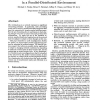Free Online Productivity Tools
i2Speak
i2Symbol
i2OCR
iTex2Img
iWeb2Print
iWeb2Shot
i2Type
iPdf2Split
iPdf2Merge
i2Bopomofo
i2Arabic
i2Style
i2Image
i2PDF
iLatex2Rtf
Sci2ools
114
click to vote
PPOPP
1991
ACM
1991
ACM
Dynamic Node Reconfiguration in a Parallel-Distributed Environment
Idle workstations in a network represent a significant computing potential. In particular, their processing power can be used by parallel-distributed programs that treat the network as a loosely-coupled multiprocessor. But the set of machines free to participate in load sharing changes over time as users come and go from their workstations. To make full use of the available resources, parallel-distributed applications in the network must reconfigure to adapt to these changes as they run. This paper describes a node reconfiguration facility for Amber, an object-based parallel programming system for networks of multiprocessors. We describe system support that allows a parallel Amber application to adapt to changing network conditions by expanding to make use of new nodes as they become idle, and by contracting as nodes become busy. A key characteristic of Amber’s node reconfiguration is that it is handled at the user level in the Amber runtime system it does not depend on a kernel-lev...
Amber’s Node Reconfiguration | Distributed And Parallel Computing | Node Reconfiguration | Node Reconfiguration Facility | PPOPP 1991 |
Related Content
| Added | 27 Aug 2010 |
| Updated | 27 Aug 2010 |
| Type | Conference |
| Year | 1991 |
| Where | PPOPP |
| Authors | Michael J. Feeley, Brian N. Bershad, Jeffrey S. Chase, Henry M. Levy |
Comments (0)

